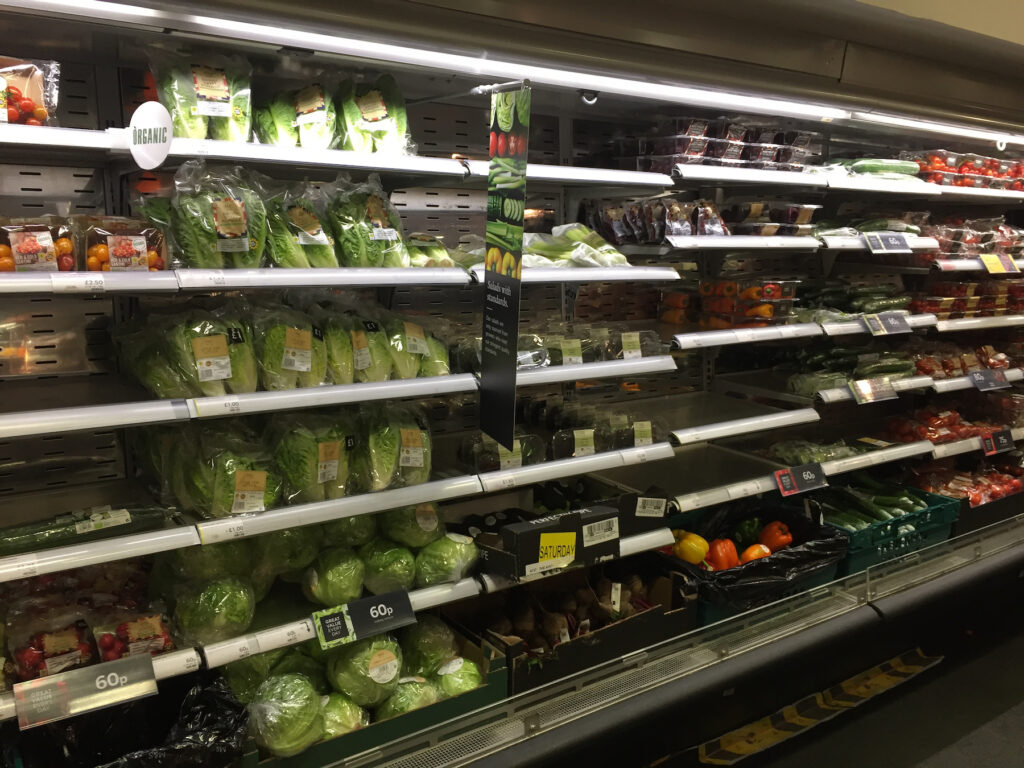Government’s approach to food policy branded “incoherent” in new report
31st July 2023
A new report by the Efra Select Committee has accused the government of failing to take food security seriously enough, and urged it to change its definition to include affordability and access to food.

Only 54% of the food eaten in the UK is home-grown or home-reared, and shocks to international trade have exposed the UK’s vulnerabilities. Stock photo for illustration only.
The newly published Food Security Report urges the government to include affordability and access to food as part of its definition of food security.
It quotes food minister Mark Spencer MP as saying “household affordability of, and access to, food” is not part of the definition of food security. The committee responded “we disagree” and advised the government to “change its position”.
Only 54% of the food eaten in the UK is home-grown or home-reared, and shocks to international trade – such as the Russian invasion of Ukraine and Brexit – have exposed the UK’s vulnerabilities, the commitee said.
Households forced to skip meals
Meanwhile, a fifth of UK households are struggling to access good quality food at reasonable prices, causing them to turn to unhealthy alternatives with implications for public health, especially for the poorest in society.
Many households are also having to resort to skipping meals to save money.
Consumer price inflation, which has risen to its highest rates in more than 40 years, is partly responsible – as is promotion by retailers of low-cost food such as biscuits, burgers and other highly processed items.
Whilst food retailers have noted low margins, they are also paying high levels of dividends to shareholders, the report said.
Key recommendations
Labour shortages have led to some UK food production being moved overseas. Migrant labour fulfils 99% of seasonal harvesting work but the number of visas available to migrant labourers was lower than requested by the NFU.
The report said the government must address this shortage and “prioritise the country’s long term food security over other considerations”.
With just one factory in the UK for producing nitrogen, the report also advised the government to increase this capacity whilst exploring incentives offered by other governments to competitor plants. The committee asked for a plan to be produced within six months of its report.
Despite an independent review by former government ‘food Tsar’ Henry Dimbleby, which made the link between the types of food we eat and the nation’s health, the government’s Food Strategy in June 2022 did not cover this topic, the Efra Committee added.
The recommended tax on foods high in sugar and salt was not adopted, prompting the committee to call for detailed response to all recommendations in the Dimbleby Review, as well as an annual analysis on all food security issues.
The government’s approach to food policy was described in the report as “incoherent” – with 15 departments and agencies besides Defra being involved in elements of food policy development and delivery. The Cabinet Office was asked for a comprehensive review of all aspects of food policy, with a report to be published within 12 months.
“Food security matters to us all”
Commenting on the report, Efra Committee chair Sir Robert Goodwill said: “Food security matters to us all. It is vital to farmers; it is vital to other food producers. And of course, it is vital for every citizen up and down the land to have a square meal at a reasonable price.
“But surprisingly, the government does not appear to be taking this very basic matter anywhere near seriously enough.
“This report is calling, through its various recommendations, for much more attention to be paid to the guaranteed supply of good quality food – at prices which suit both producers and consumers. I know that is not an easy balance to strike. But that’s what government is for. It must read the report carefully and act accordingly”.
Responding to the report, NFU president Minette Batters supported its recommendation for strong leadership on food security, and stressed the need for a coordinated approach from all government departments.
“At such a tricky time for many UK households, the report addresses much of the inflationary pressures experienced by both families and farmers and growers. Everyone should have access to affordable, quality, sustainable food and British farmers and growers need the support of Government to have the confidence to continue producing.”
Ms Batters added: “In the same week as CF Fertilisers announced it will be permanently closing its Billingham ammonia plant, the report’s acknowledgement of the risk of there only being one fertiliser factory in the UK is a timely one. Availability of fertiliser is a crucial element of domestic food security and Government should look closely at how this could impact production.”
